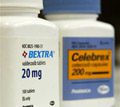 - Client Reviews
- Client Reviews November 10, 2004A leading heart researcher says the painkiller Bextra increases the risk of heart attacks and strokes and may pose a greater risk than Vioxx. But Bextra’s manufacturer calls the new findings “unsubstantiated.”
November 10, 2004A leading heart researcher says the painkiller Bextra increases the risk of heart attacks and strokes and may pose a greater risk than Vioxx. But Bextra’s manufacturer calls the new findings “unsubstantiated.”
In October, the painkiller Vioxx was voluntarily pulled from the market because it was found to increase heart attack and stroke risk.
In a new study, Garret FitzGerald, MD, PharmD, of the University of Pennsylvania, says he looked at data of Bextra use in more than 2,000 heart bypass surgery patients and nearly 5,700 arthritis patients.
Among all the patients heart bypass surgery patients and arthritis patients FitzGerald says the risk for heart attacks and strokes was more than twice as high in those taking Bextra.
FitzGerald announced the results during a news conference at the American Heart Association’s annual meeting.
FitzGerald says the finding should not be overstated, yet he was quoted in a news article in the New York Times as saying “The magnitude of the signal with Bextra is even higher than what we saw in Vioxx … This is a time bomb waiting to go off.” When WebMD asked if that quote was not itself an example of overstatement, FitzGerald said that it wasn’t and offered this example of overstatement: “I could have said the bomb went off.”
FitzGerald notes that his findings do not come from a placebo-controlled trial, which is the gold standard of medical evidence in which a drug is compared to a placebo. But FitzGerald says that in light of the Vioxx withdrawal “the landscape has changed, which adds weight to these findings.”
Moreover, he says that his study suggests the problem is not with a single molecule found in a single drug like Vioxx, but rather a problem for the entire class of drugs that Vioxx and Bextra belong to, called Cox-2 inhibitors. One other Cox-2 inhibitor is available in the U.S.Celebrex. Bextra and Celebrex are made by Pfizer, a WebMD sponsor.
FitzGerald says he is not recommending that Cox-2 inhibitors be taken off the market but that he thinks patients with heart disease should be advised of the risk associated with the drugs.
Bextra’s Manufacturer Responds
Pfizer issued a statement in response to a New York Times article in which the company states that the news article “draws unsubstantiated conclusions about the cardiovascular safety of its Cox-2 medicine Bextra and is based on information that has not been published in a medical journal or subject to independent scientific review.”
The company notes that an analysis of studies of arthritis patients published earlier this year in the American Journal of Therapeutics found no such risk with Bextra. Pfizer says those findings showed that short- and intermediate-term treatment with Bextra was not associated with an increased risk of heart attack or stroke compared with more traditional anti-inflammatory drugs, like ibuprofen or naproxen, or with placebo. That conclusion was based on an evaluation of clinical trials of nearly 8,000 patients treated with Bextra for up to 52 weeks.
An FDA advisory committee is set to meet in February 2005 to review the safety of all Cox-2 inhibitors.

